-
Featured News
Shel Talmy: August 11, 1937 – November 14, 2024
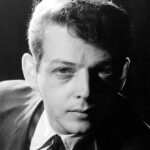 By Harvey Kubernik
The legendary and influential record producer Shel Talmy passed away in mid-November from a stroke at age 87.
Talmy arranged and produced the Kinks recordings 1964-1967, “My G
By Harvey Kubernik
The legendary and influential record producer Shel Talmy passed away in mid-November from a stroke at age 87.
Talmy arranged and produced the Kinks recordings 1964-1967, “My G -
Featured Articles
The Beatles: Their Hollywood and Los Angeles Connection
 By Harvey Kubernik
JUST RELEASED are two new installments of the Beatles’ recorded history, revised editions of two compilation albums often seen as the definitive introduction to their work.
Or
By Harvey Kubernik
JUST RELEASED are two new installments of the Beatles’ recorded history, revised editions of two compilation albums often seen as the definitive introduction to their work.
Or -
Screaming Lord Sutch: An interview with a raving loony

by Mike Stax
When David Sutch took his own life in June 1999 the world of rock ’n’ roll lost one of its wildest and most unforgettable characters. As Screaming Lord Sutch, his colorful, larger than life personality was a fixture of the British political landscape, but for rock’n’roll fans he will be remembered for his amazing recorded legacy: the mad rock and horror sides he cut with Joe Meek, the demented mid-‘60s gems like “Train Kept A-Rollin’” and “All Black and Hairy,” the proto-psychedelic “The Cheat,” the hard rockin’ Heavy Friends… For someone with no discernible music talent he sure made a lot of great records. And if you make great records you live forever.
In April 1993 I interviewed Lord Sutch by telephone for a two-part feature in the Union Jack newspaper. It was a memorable chat. Sutch was a charming, down-to-earth man, with an in-built, infectious sense of humor. Within a few minutes it was obvious my carefully prepared list of questions was out the window. Sutch talked a mile a minute, determined to cover all the highlights of his career, specifically: precise election results and of course the name of every single one of the famous players who’d passed through the ranks of the Savages (“my musicians,” as he called them). Between our chuckling, I made intermittent attempts to direct the flow of conversation, but there was little point, Sutch was on a roll, dashing down tangential side alleys and free-associating memories as the whim took him. Who was I to stop him in his tracks to clarify the smaller facts? It was all entertaining stuff – just let the tape roll.
Caveat emptor: As anyone who has read his autobiography, Life as Sutch, can tell you, historical accuracy wasn’t Sutch’s strong suit, entertaining people was. Some of Sutch’s tales involve a certain degree of exaggeration or misconception. All quite innocent, but bear it in mind as you read.
• • •
Cleaning Up the Puke Stain: A Response to Rolling Stone’s Punk Top 40 List
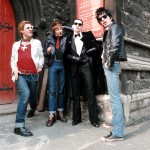
By Doug Sheppard
Given the sheer volume of stupidity on the Internet, most of it should be taken with a grain of salt. And then there’s Rolling Stone‘s “40 Greatest Punk Albums of All Time.”
Sure, you could laugh it off as the product of a magazine that’s had a tenuous relationship with real rock ‘n’ roll-hence punk-throughout its history. Or you could just give Rolling Stone a pass based on the presence of David Fricke, whose command of music history and excellent writing are unparalleled. Or maybe the magazine could be excused based on its stellar political coverage-such as the 2008 exposé on John McCain.
At least that was my first reaction. But it soon became apparent that the punk top 40 was more like your best friend puking on your carpet during a party: Sure, it’s funny when you’re all carousing, but by the next day there’s a smelly stain there. You gently admonish him in a text to get it off your chest, and, ideally, he apologizes for taking too many Jägermeister shots.
Rolling Stone definitely left a puke stain with this one. Putting aside the complaints about what specifically is or isn’t on the list, the main issue is that most of the titles aren’t even punk. It’s the kind of rundown one would expect from a music theory professor, or perhaps on a “punk” compilation CD sold at Starbucks, but that bears little resemblance to the form.
Punk’s DIY ethos inspired many musical genres-everything from punk offshoots to postpunk to power pop to modern strains of metal. Punk itself, however, can be defined as modern rock ‘n’ roll: fast, driving, angst-ridden rebellion with blazing guitar. The kind of music that makes you want to jump around the room, strain your veins singing along, clench your fist, grit your teeth and break shit up.
Or “Smash It Up,” as the Damned once famously sang. Rolling Stone did at least get that right: the Damned “just didn’t have that one perfect LP statement.” They had two: Damned Damned Damned and Machine Gun Etiquette.
Actually, like many other great bands, the Damned didn’t make the Rolling Stone list, which was apparently compiled by eight people-including Fricke, who I’m guessing had minimal input. In any event, lest it become a template for an impressionable teenager just discovering punk, I present a response in the form of a real Punk Rock Top 40-with emphasis on the rock. Yeah, it’s only my opinion, and I’m not so pretentious to call it definitive. But you know how musical opinions are: You’re always right and everyone else is an idiot.
The 40 are ranked in order, though after about 20 or so it got tougher to distinguish. Following my list, I commented on Rolling Stone‘s choices, which should also explain most of my exclusions.
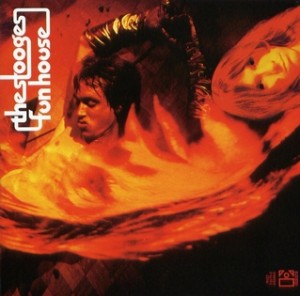
1. THE STOOGES – Fun House (1970)
The album that laid the groundwork for everything that followed, particularly in the guitar sound and the vocal delivery. Miles Davis called them “the real shit.” Still sounds like rebellion 46 years later.
2. THE MC5 – High Time (1971)
Inspired the Stooges with their streetwise fusion of the British Invasion, R&B, blues and free jazz, and politically-charged lyrics that struck like lightning bolts. They fought the law and the law initially won, but their impact is still being felt today.
3. THE BUZZCOCKS – Singles Going Steady (1979)
Punk energy, pop hooks, teen angst and intelligence on one brilliant comp of eight of the greatest singles ever made.
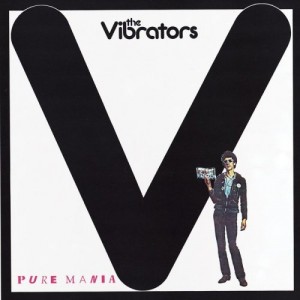
4. THE VIBRATORS – Pure Mania (1977)
Glam band reinvents itself as punk and produces an unrelentingly catchy, energetic album with S&M lurking beneath the surface.
5. RADIO BIRDMAN – Radios Appear (worldwide version) (1978)
Featuring a Michigan transplant on guitar, these Aussies wore their Detroit high-energy rock ‘n’ roll influences on their sleeves and combined them with the right dose of the 1960s, indigenous Australian rock, and Blue Öyster Cult. “New Race” alone leaves almost all competition in the dust.
6. THE DAMNED – Machine Gun Etiquette (1979)
Damned Damned Damned was power and rebellion; Machine Gun Etiquette is power, rebellion, pop hooks, experimentation and advanced lyrical themes in one terrific package.
An Interview with Jimmy Walker of the Knickerbockers
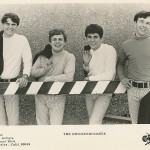
By Katy Levy
So, if you don’t mind, let’s go back right at the beginning… You are originally from the East Coast, is it true that you were born in the Bronx?
This is true! I’m from New York.
How was it like when you grew up?
When I lived in the Bronx, well… growing up there was kind of interesting. It is New York and it is one of the most interesting places on the planet. There’s so much to do and see and I was an avid sports fan so I could go to see the New York Yankees play. I played a lot of sports myself. There were a lot of outlets for that and also for music. I used to go downtown to Manhattan with friends and we’d go to Birdland and other jazz places and watch the really great musicians play. I think that people who come from New York, if they take advantage of it, are around some of the greatest situations in the world, best musicians and artists. Because people from other places, other states, other countries go to New York to act and play, to study music and study writing. So you have the advantage of people coming to your city, bringing their talent with them and you don’t have to travel very much. It’s a melting pot. So, I think that was really cool. I mean, you’ve got great stuff like museums, the Natural History, the New York Public Library on 2nd Avenue. You’ve got the zoo; the best zoo in the world is in the Bronx… the Bronx Zoo. You’ve got all kind of places that you can go and take advantage of for educational purposes and just to broaden your views of the world.
I feel that was the greatest part about growing up in New York… It had its disadvantages. In my neighborhood it started to get tough! There were a lot of gangs started to come up in the late ‘50s. That’s when it was starting to get downright dangerous. That was the disadvantage of being a teenager in a dangerous neighborhood, you really had to watch yourself. But you know, it makes you street smart!
Do you come from a musical background or are you the only artist in the family?
The only person in the family who had any musical ability was my dad, he could sing really well. And he could play the drums, same as me.
Well, actually my next question was about your discovery of the drums, where it came from, what attracted you to that particular instrument. So it came from your dad?
Yeah! I think if you have a talent, at least me at a very early age – I was maybe seven or eight years old – you just naturally gravitate towards it. I watched drummers on television. My uncle was a musicologist and a copyist for the army band at West Point. He bought me my first snare drum and sticks and brushes when I was nine. He was also a kind of saxophone player and even in our first little jam session in my house, my uncle pulled out his saxophone and we started playing old swing stuff. He noticed and said that I had an unusual gift for it. So even at an early age, it was just totally natural for me to be able to play the drums. I couldn’t understand why everybody couldn’t do it!
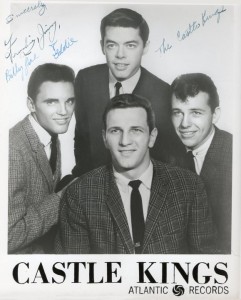
So, before you joined the Knickerbockers, you were in a New York band called the Castle Kings. What sort of music did you play?
Yeah! Well you know, the street doo-wop, rock ’n’ roll, Elvis, Carl Perkins, Jerry Lee Lewis, the Isley Brothers, Little Richard – the early rock ’n’ roll stuff. One late afternoon, we were standing outside in front of Atlantic Records. We just had a meeting with Dot Records, they were in the same building as Atlantic. So we’re standing outside, harmonizing, waiting for one of the guys’ dad to pick us up – this is a true story – harmonizing to some goofy song that one of the guys in the band wrote and Ahmet Ertegun, the president of Atlantic Records, heard us and told us to meet him the next day. So we did! He actually signed us to a contract and we recorded three or four records. I was recording with some of the legends of the business. People like Phil Spector, Ahmet Ertegun and his brother Nesuhi. These guys were legends and we were in the studio with them and I didn’t know who they were! So I mean, at a very early age, we were doing things with the heavyweights of the business and we didn’t even know it.
Apart from being an amazing drummer, you also sing… Is it true you that you joined the Knickerbockers because of that extra talent and why were they looking for a drummer who could sing?
They were looking for a drummer and the first time I saw the Knickerbockers was in a neighborhood venue. It was a supermarket that had been emptied, sold-out and it was reopened to do a little party on Memorial Day. I was walking down the street and I heard this music so I went back and they were set up playing as a trio. Buddy, the saxophone player was playing the drums, really well, and I thought, boy this is a band I’d love to play with! A couple of weeks or months later, they called me up because they’d heard I was a drummer and that I was looking for work. So I went and set up in John and Beau’s house and we played, but my drumming skills were a little bit on the amateur side because I was still young. Then they asked me to sing, I sang some rock ’n’ roll stuff and John and Beau’s mum heard me sing and she said “Hire that guy, he does sound good”! So my skills with drumming didn’t get me the work, it was the singing. Then I improved as a drummer because you get to play a lot. Also, Buddy taught me a lot of stuff on the drums that he got from other good drummers. But it was actually my voice that got me the job.